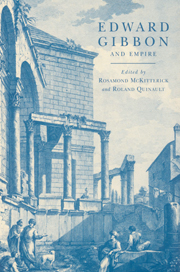Book contents
- Frontmatter
- Contents
- List of contributors
- Preface
- List of abbreviations
- Introduction
- 1 Gibbon and the later Roman Empire: causes and circumstances
- 2 Gibbon and Justinian
- 3 Gibbon and the middle period of the Byzantine Empire
- 4 Byzantine soldiers, missionaries and diplomacy under Gibbon's eyes
- 5 Gibbon and the later Byzantine Empires
- 6 Gibbon and the Merovingians
- 7 Gibbon, Hodgkin, and the invaders of Italy
- 8 Gibbon and the early Middle Ages in eighteenth-century Europe
- 9 Gibbon and the ‘Watchmen of the Holy City’: revision and religion in the Decline and fall
- 10 Gibbon and international relations
- 11 Gibbon's Roman Empire as a universal monarchy: the Decline and fall and the imperial idea in early modern Europe
- 12 The conception of Gibbon's History
- 13 Winston Churchill and Gibbon
- Epilogue
- Index
7 - Gibbon, Hodgkin, and the invaders of Italy
Published online by Cambridge University Press: 02 December 2009
- Frontmatter
- Contents
- List of contributors
- Preface
- List of abbreviations
- Introduction
- 1 Gibbon and the later Roman Empire: causes and circumstances
- 2 Gibbon and Justinian
- 3 Gibbon and the middle period of the Byzantine Empire
- 4 Byzantine soldiers, missionaries and diplomacy under Gibbon's eyes
- 5 Gibbon and the later Byzantine Empires
- 6 Gibbon and the Merovingians
- 7 Gibbon, Hodgkin, and the invaders of Italy
- 8 Gibbon and the early Middle Ages in eighteenth-century Europe
- 9 Gibbon and the ‘Watchmen of the Holy City’: revision and religion in the Decline and fall
- 10 Gibbon and international relations
- 11 Gibbon's Roman Empire as a universal monarchy: the Decline and fall and the imperial idea in early modern Europe
- 12 The conception of Gibbon's History
- 13 Winston Churchill and Gibbon
- Epilogue
- Index
Summary
In a lecture given to the British Academy in 1919 G. M. Trevelyan spoke of the ‘passionate and many-sided devotion’ of the English ‘to the literature, language, art, history and civilization of ancient, of mediaeval and of modern Italy; the English had always displayed a particular love for Italy’. It is undoubtedly true that English scholars have made a distinguished contribution to the study of all periods of Italian history. As Trevelyan remarked, Gibbon is a noteworthy example: Decline and fall grew out of a plan to write a history of the city of Rome itself. Following his instinct as a classicist, he saw Italy as representative of the western aspect of Mediterranean civilization, and lamented that the government and army of Rome had fallen into the hands of non-Romans and non-Italians. The effects of Gibbon's grand tour of the peninsula, and especially his visit to Rome, are well-known, and Italy figures prominently throughout Decline and fall. Since his treatment of the peninsula in the fifth century and beyond was undoubtedly influential, it is worthwhile to examine the strengths and weaknesses of his approach and the respects in which his interpretations have been confirmed or disproved by more recent research. In particular, does his view of a steady weakening of the Roman element in Italy require modification? To what extent did Gibbon's antipathy to the undoubtedly increased role of Christianity distort his view of key developments?
- Type
- Chapter
- Information
- Edward Gibbon and Empire , pp. 137 - 161Publisher: Cambridge University PressPrint publication year: 1996
- 1
- Cited by



